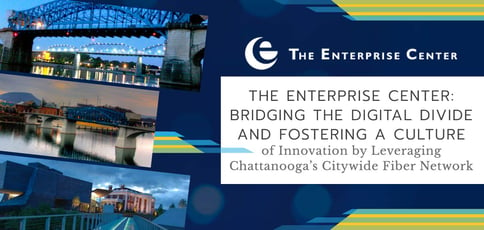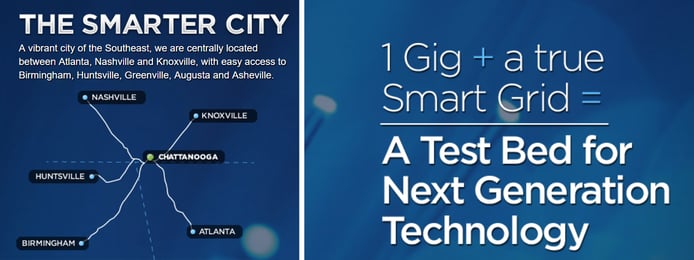
TL; DR: The Enterprise Center (TEC) is working to maximize the potential of Chattanooga’s robust 100% fiber network, which is available to every home and business throughout the community. Built by the city’s public electric utility, EPB, the 10GB network allows for upload and download speeds that are 200 times faster than the U.S. average. With new leadership at the helm, TEC hopes to help Chattanooga leverage its technical assets to spur the innovation economy and bridge the digital divide.
Chattanooga, Tennessee, may once have been known for Glenn Miller’s 1941 song, “Chattanooga Choo Choo,” but these days, it’s blazing-fast internet that is putting the city on the map.
EPB, one of the largest publicly owned electric power providers in the U.S., is supplying Chattanooga with the country’s first communitywide 100% fiber network. Available to every home and business, the 10GB network has become a model for other cities looking to draw in tech talent.

The Enterprise Center is working to encourage innovation while bridging the digital divide in Chattanooga.
The Enterprise Center (TEC), a nonprofit formed in 2013 to establish Chattanooga as a hub of innovation, is working to leverage the fiber optic network to build a better city and world. It aims to achieve this goal by integrating top-notch connected technologies with a dynamic culture of innovation and entrepreneurship.
“We have three missions: research and development, building up the Innovation District of Chattanooga, and fostering digital equity,” said Mary Helen Montgomery, Marketing and Communications Manager at TEC. “They all fall under the umbrella of making sure everyone can participate in the innovation economy.”
TEC is committed to mitigating digital inequality through inclusion programs that provide Chattanoogans with the experience, tools, and connectivity they need to thrive in a technology-driven world. With new leadership at the helm, the organization ultimately hopes to help the city leverage its advanced technical assets to stimulate the economy and bridge the digital divide.
The Innovation District of Chattanooga: A Hub for Entrepreneurs
TEC is powered by a small staff of passionate individuals who work closely with the nonprofit’s partners and the community at large.
“We’re deeply ingrained in the community — we work closely with EPB, the University of Tennessee at Chattanooga (UTC), the Chattanooga Chamber of Commerce, city officials, and other organizations,” Mary Helen said. “We’re a convener in a lot of ways: We get a lot of people in a room together where we can work toward common goals.”
The nonprofit is also managing the Innovation District of Chattanooga, a mix of start-up businesses, incubators, accelerators, and other innovation generators located within the city’s walkable urban core.
At the heart of the Innovation District is The Edney Innovation Center, a 10-story building that includes working spaces for public, private, and nonprofit tenants as well as an entire floor dedicated to community events and workshops. The center also includes amenities such as conference rooms, roof access, lockers, showers, changing rooms, and a game room.
TEC’s vast network of partners are actively involved in its programs, but the center constantly seeks community input and participation, Mary Helen said.
“The work that we’re involved with is pretty large in scale compared with the number of people on our staff, and that’s because these large organizations, like the University of Tennessee at Chattanooga, already have a significant reach,” she said.
Cutting-Edge Research and Application Development
Mary Helen said TEC is also part of a research collaborative using Chattanooga’s Smart Grid and 10GB network as a test bed for next-generation technology. With the city’s Smart Grid, data is received in real time, so it can be immediately used to create a self-healing grid with high power quality and reliability. This results in significantly reduced outage times, increased security, and lower energy generation costs.
To promote Chattanooga as a living laboratory for cutting-edge research, TEC works in a public-private partnership with EPB, UTC, and other partners to aid in the submission of grant applications to the National Science Foundation (NSF).
NSF recently announced two grants enabling researchers at UTC to use the city as a test bed when studying mapping and analysis of underground infrastructure, as well as fleet management and coordination of autonomous vehicles.

TEC is working closely with partners to bring research and development to the city.
An additional NSF project is working to deploy sensors that track and communicate the health-related elements of air quality in the city. Mozilla also provided three grants intended to expand research on virtual reality, 4K video streaming, and 4K microscopes.
In addition, US Ignite, a group working to accelerate smart city development, will contribute more than $90,000 over three years to help TEC support the development of new applications for high-speed bandwidth.
Chattanooga is fortunate to have access to the computational assets of its smart grid and 10GB network, not to mention its close partnership with Oak Ridge National Laboratory (ORNL), a science and energy lab governed by the U.S. Department of Energy. ORNL is currently preparing a staffed office in Chattanooga to advance the city as a testing ground, particularly in the areas of energy, cybersecurity, and advanced manufacturing.
Tech Goes Home: Bridging the Digital Divide
TEC is mindful of the community it serves and is focused on understanding internet access from the citizen’s perspective. “Some people have access to the internet and computers, and a lot of people don’t,” Mary Helen said. “That has really harmful effects in school because some kids are able to complete homework quickly and others aren’t.”
The problem of access isn’t limited to Chattanooga. According to the Pew Research Center, approximately 30% of adults with household incomes below $30,000 a year don’t own a smartphone, 44% don’t have broadband services, and 46% go without a traditional computer.
Mary Helen said that people without online access face significant barriers when trying to enter the workforce. “They may lack the skills to do a job well or even have difficulties finding and applying to a job in the first place,” she said. “It’s a real problem, and it affects every city in the country.”
To help bridge the digital divide in Chattanooga, TEC is developing programs that ensure the city’s digital assets are accessible to everyone. One such program is Tech Goes Home Chattanooga, an effort to address gaps in education, hardware, and internet access.
“We go into neighborhoods, churches, and community organizations — places where people already go and feel comfortable — and bring them in to local workshops focused on digital literacy to help them learn new skills,” Mary Helen said. “We want to make sure that everybody can have the tools they need to operate in the 21st century.”
The workshops include a 15-hour curriculum, options to enroll in low-cost internet plans, and a new laptop, all for a $50 enrollment fee.
New Leadership: Helping TEC Reach New Heights
Moving forward, TEC will operate under the leadership of President Deb Socia, who previously served as Executive Director of Next Century Cities, a nonprofit that supports community leaders across the country as they work to ensure equal access to fast, affordable, and reliable internet.
Deb also founded Tech Goes Home Boston, the program that inspired TEC’s own undertaking, Tech Goes Home Chattanooga.
“Our new president has a deep history and expertise in community broadband networks, digital literacy, and digital equity programs,” Mary Helen said. “We’re really excited about the vision that she’s going to bring to the organization.”
HostingAdvice.com is a free online resource that offers valuable content and comparison services to users. To keep this resource 100% free, we receive compensation from many of the offers listed on the site. Along with key review factors, this compensation may impact how and where products appear across the site (including, for example, the order in which they appear). HostingAdvice.com does not include the entire universe of available offers. Editorial opinions expressed on the site are strictly our own and are not provided, endorsed, or approved by advertisers.
Our site is committed to publishing independent, accurate content guided by strict editorial guidelines. Before articles and reviews are published on our site, they undergo a thorough review process performed by a team of independent editors and subject-matter experts to ensure the content’s accuracy, timeliness, and impartiality. Our editorial team is separate and independent of our site’s advertisers, and the opinions they express on our site are their own. To read more about our team members and their editorial backgrounds, please visit our site’s About page.

